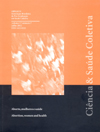0872/2011 - The evidences of qualitative research regarding doula assistance during labor and the birth
Evidências qualitativas sobre o acompanhamento por doulas no trabalho de parto e no parto
Author:
• Raimunda Magalhães da Silva - SILVA, R.M - Fortaleza, CE - UNIVERSIDADE DE FORTALEZA - <rmsilva@unifor.br>ORCID: https://orcid.org/0000-0001-5353-7520
Co-author(s):
• Laura Pinto Torres de Melo - Melo, L.P.T - UNIVERSIDADE DE FORTALEZA - <lauratorresdemelo@hotmail.com>• Antonio Rodrigues Ferreira Junior - Ferreira Junior, Antonio Rodrigues - Fortaleza, Ceará - UNIVERSIDADE DE CAMPINAS - <junioruruoca@hotmail.com>
• HERLA MARIA FURTADO JORGE - JORGE, H.M.F - CAMPINAS, SÃO PAULO - UNIVERSIDADE DE FORTALEZA - <herlinha17@hotmail.com>
• Nelson Filice de Barros - Barros, N.F. - Campinas, SP - UNIVERSIDADE DE CAMPINAS - <nelfel@uol.com.br>
Thematic Area:
Saúde e GêneroAbstract:
The evidences of qualitative research regarding doula assistance during labor and the birthThe objective of this study was to identify, evidence of the work of doulas assisting women in labor. It is a meta syntheses of articles from 2000 to 2009 found in the data bases MEDLINE, PubMed, SciELO, and LILACS using the descriptors: doulas, gestation labor, and alternative therapy. Seven articles were selected for the study and three categories were created: the support provided by the doulas, the birth mother‘s experiences, the professional relationship and opinions and experiences of professionals. The doulas offered physical, emotional, spiritual and social support. Experiments showed that the professionals stimulated the mother/child relationship, oriented towards successful breast feeding, and contributed to preventing post-partum depression. Controversy among professionals was observed regarding accepting the role of the doula with the obstectric staff. The doula’s care was considered innovative, calming, encouraging, and supplied for all the needs of the pregnant woman. It is concluded that qualitative studies on the work of doulas are recent, incipient, but revealing as to the important possibility of humanizing labor and birth.











